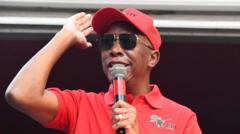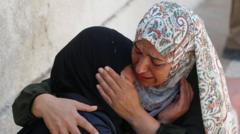The UK Home Office has declared South African politician Julius Malema as “non-conducive to the public good,” resulting in a ban on his entry into the UK. The decision was driven by Malema’s controversial remarks and support for militant groups, particularly Hamas, alongside his aggressive rhetoric towards racial groups within South Africa. This marks the second instance of Malema being denied entry in recent months, further igniting debates on freedom of expression and the implications of such bans on political discourse.
Julius Malema's UK Entry Banned Amid Controversy Over Radical Views

Julius Malema's UK Entry Banned Amid Controversy Over Radical Views
South African politician Julius Malema has been barred from entering the UK, raising questions about international immigration policies regarding political figures.
The UK government has taken a firm stance against Julius Malema, a prominent and polarizing figure in South African politics known for his radical views. The Home Office’s justification for the denial letter referenced Malema’s recent support for Hamas following the October 7 attacks, wherein he indicated his party, the Economic Freedom Fighters (EFF), would arm Hamas if they gained power. Additionally, his inflammatory remarks regarding the "slaughter of white people" and threats to "take up arms" have contributed to the perception of him being an undesirable entry into the UK.
Malema's criticism of the decision echoed in statements from his party, labeling the ban as "cowardice" and asserting it undermines democratic dialogue. This denial of entry marks a significant point in his political trajectory, as it follows a previous rejection due to a late application, indicating a stringent stance from the UK government on the matter.
Furthermore, Malema was recently highlighted in a video presented by former US President Donald Trump during a meeting with South African President Cyril Ramaphosa, bringing further attention to his controversial political standing. With no right to appeal against this latest decision and future applications forecasted to meet similar disapproval, the action raises poignant questions about the boundaries of political commentary and the rights of international political figures.
As the situation evolves, it remains crucial to assess the implications of such bans on political freedom and the international community's response to radical political expressions.
Malema's criticism of the decision echoed in statements from his party, labeling the ban as "cowardice" and asserting it undermines democratic dialogue. This denial of entry marks a significant point in his political trajectory, as it follows a previous rejection due to a late application, indicating a stringent stance from the UK government on the matter.
Furthermore, Malema was recently highlighted in a video presented by former US President Donald Trump during a meeting with South African President Cyril Ramaphosa, bringing further attention to his controversial political standing. With no right to appeal against this latest decision and future applications forecasted to meet similar disapproval, the action raises poignant questions about the boundaries of political commentary and the rights of international political figures.
As the situation evolves, it remains crucial to assess the implications of such bans on political freedom and the international community's response to radical political expressions.




















